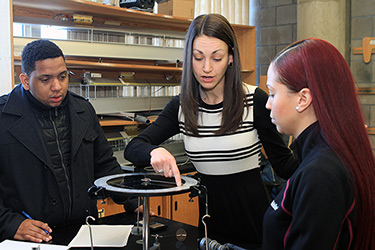Programs of Study
Degree Programs
Environment, Sustainability, and Management - Associate in Science (ESMD)
The Environment, Sustainability, and Management Associate in Science degree prepares students to achieve professional employment in sustainable agriculture, horticulture, land management, and related businesses in the Green Sector. The program introduces students to key concepts in resource management, pollution, our evolving interactions with an ever-changing ecological landscape, and industry practices necessary to operate a business effectively yet conscientiously. The curriculum explores topics in land, water, and air; how humans positively and negatively impact their local and global environments; business management, entrepreneurship, innovation, and design, and includes a cooperative work experience with an employer in agriculture, sustainability, or a related field.
Science - Associate in Science (SCID)
This degree program is intended for individuals who wish to pursue a career in science or a related field. Such fields include, but are not limited to, astronomy, biochemistry, biology, biophysics, biotechnology, chemistry, environmental geology, environmental science, forensics, forestry, geochemistry, geology, geophysics, home economics, marine biology, meteorology, mortuary science, nutrition (or dietetics), oceanography, optometry, pharmacy, physical education, physics or plant science. This program also is intended for those who wish to pursue medical, dental or veterinary degrees.

Note:A minimum of a bachelor’s degree is usually required of individuals planning to work in science or a related area. Therefore, students should take the CCRI Associate in Science degree program with the expectation of transferring to a four-year college or university. The choice of which elective credits to select should be made in consultation with an advisor from one of the science departments in accordance with the transfer requirements of the four-year school. Many courses require prerequisites, corequisites and/or testing. See course descriptions for details.
Students should consult the transfer requirements of their intended school of transfer.
Certificate Programs
-
Biotechnology
-
Ecology and Environmental Biology, Aquatic
-
Ecology and Environmental Biology, Terrestrial
Biotechnology
The Biotechnology Certificate Program prepares students for entry into the biomanufacturing industry in as little as two semesters, with an emphasis on the knowledge and skills necessary to succeed in this rapidly growing field. Students receive hands-on instruction designed for individuals at all levels of workplace experience and education. Students earning the certificate will be qualified for many entry-level positions in biotechnology and related fields, and those with prior experience and/or education can use the certificate as a bridge to more advanced positions.
The Biotechnology program includes courses in biotechnology, microbiology, chemical technology, and instrumentation. Coursework is designed to mirror many of the concepts and techniques utilized in biotechnology and related industries. Students will be trained in laboratory and math skills, working with DNA and protein, upstream and downstream processing, aseptic technique, gowning, documentation, GMP standards and FDA regulations. In addition, students may expect access to industry professionals through classroom speakers, manufacturing facility tours, industry seminars, and professional networking.
Biotechnology Additional Information and Resources
Ecology and Environmental Biology, Aquatic
The Environmental Biology certificate is designed for the student who wants to enter the Environment and Sustainability workforce with a solid knowledge and skills in aquatic ecology and environmental biology. Students will experience the Rhode Island environment and ecology in hands-on laboratory settings that take them into the field, in addition to learning theory and experimental methods in the classroom. Students will learn about sustainable aquatic food systems, marine systems, earth systems, and the interaction of all of these in the greater environment.
Upon completion of the certificate, students may elect to complete another certificate in Environmental Biology or pursue a Business Certificate. Students may also continue their education by applying all courses to the completion of the Environment, Sustainability, and Management Associate of Science degree.
Ecology and Environmental Biology, Terrestrial
The Environmental Biology certificate is designed for the student who wants to enter the Environment and Sustainability workforce with a solid knowledge and skills in terrestrial ecology and environmental biology. Students will experience the Rhode Island environment and ecology in hands-on laboratory settings that take them into the field, in addition to learning theory and experimental methods in the classroom. Students will learn about insects, soil, geology, plants, and trees and the interaction of all of these in the greater environment.
Upon completion of the certificate, students may elect to complete another certificate in Environmental Biology or pursue a Business Certificate. Students may also continue their education by applying all courses to the completion of the Environment, Sustainability, and Management Associate of Science degree.
Biology Links
Contact Information
Leadership
- Christine Turenius-Bell
- Department Chair
- (401) 825-2400
- [email protected]
- Knight Campus
- Room 3288
Offices
- Donna Scattone
- Office Manager, BSTM Division
- 401-825-2155
- [email protected]
- Knight Campus
- Room 2158